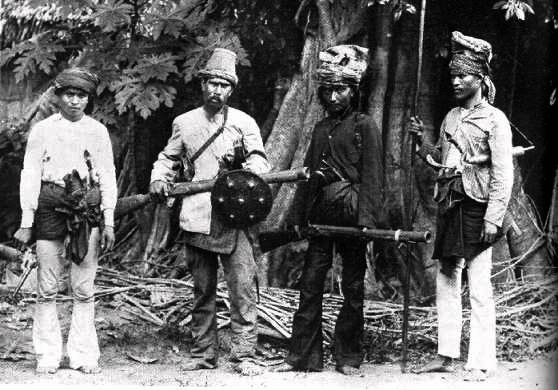In the XVI century, Aceh played a very important role as a transit area of commodity goods from East to West. Trade commodities from the archipelago such as nutmeg and spices from Banda Island, cloves from Maluku, camphor from Barus and pepper from Aceh are gathered here waiting for time to depart abroad. Aceh was the most important airport at that time which was visited by traders from various countries.
Aceh is also known for its first entry of Islam into the archipelago. The traders from Saudi Arabia, Turkey, Gujarat and India who are Moslems stop by in Aceh on their way in search of various commodities from the archipelago. Aceh, located on international shipping lanes, was the first area they visited in Southeast Asia. Then around the end of XIII century in Aceh has established a large kingdom that is Pasai Kingdom which is not only the most important traders, but also as a center for the spread of Islam both to the archipelago and abroad.

The Portuguese first landed in Aceh in 1509 visiting the Kingdom of Pedir (Pidie) and Pasai to search for silk. Then in 1511 the Portuguese conquered Malacca (now Malaysia) which caused the Sultan of Aceh to be angry. The kingdom of Aceh then sent its fleet to liberate Malacca from the colonizers' hands, but to no avail and many of the Acehnese soldiers killed and buried there. According to reliable sources Syech Syamsuddin Assumatrani, one of the great ulemas of Aceh, was killed in a war with the Portuguese in Malacca and his grave was there.
Then in the time of Sultan Iskandar Muda (1607 - 1636), then Malacca can be released back from the Portuguese grip and trade routes in the Malacca Strait again controlled by the Kingdom of Aceh Darussalam. At that time Aceh and Turkey had established close relationships so that many arms and shipping experts from Turkey came and settled in Aceh. The remaining historical evidence is the Turkish mosque, monument and tombstone in the village of Bitai (± 3 km from Banda Aceh).
On June 21, 1599 a Dutch merchant ship led by Cornelis De Houteman and his brother Frederick De Houteman landed in Aceh. However, since the Atjehnese thought that the Dutch were Portuguese they attacked the ship and killed Cornelis De Houteman and captivated Frederick De Houteman.
In 1602 another Dutch merchant ship led by Gerald De Roy was sent to Aceh by Prince Mounsts in an attempt to establish a cooperative relationship with the Kingdom of Aceh. The envoy was greeted by the Sultan of Aceh and signed the cooperation. When Gerald De Roy returned home to the Netherlands, the Sultan of Aceh sent two ambassadors to the Netherlands. One of these ambassadors, Abdul Hamid (another source mentioning Abdul Zamat) died in the Netherlands and his grave is in Middleburg, The Netherlands.
In early June 1602 British merchants were sent to Aceh by Queen Elizabeth to establish trade cooperation. The envoy was also welcomed by the sultan and signed a cooperative relationship. This relationship lasts for many years.
However, due to the greed of V.O.C, the Netherlands declared war on the Kingdom of Aceh Darussalam and attacked it on April 14, 1873. The war between the Netherlands and Aceh was the longest in the history of the world, which is about 69 years (1873-1942), which has claimed millions of lives.
In 1942 the Japanese landed in Aceh and were welcomed by the Acehnese because at that time between the Netherlands and Japan were hostile, and the people of Aceh hoped that the Japanese arrival would help drive the Dutch out of the land of Aceh. But the reality is the opposite that Japan is more virulent than the Dutch so the Acehnese feel cheated by Japan and take up arms fighting Japan.
Japan is in Aceh for only 2.5 years, but there are many battles between Aceh and Japan. Among the many wars that occurred, there are two battles that are difficult to forget because of the many casualties that fall in the Pandrah (North Aceh) and in Cot Plieng (North Aceh). The Proclamation of the Independence of the Republic of Indonesia on August 17, 1945 has at least liberated Aceh from the shackles of a devastating war.